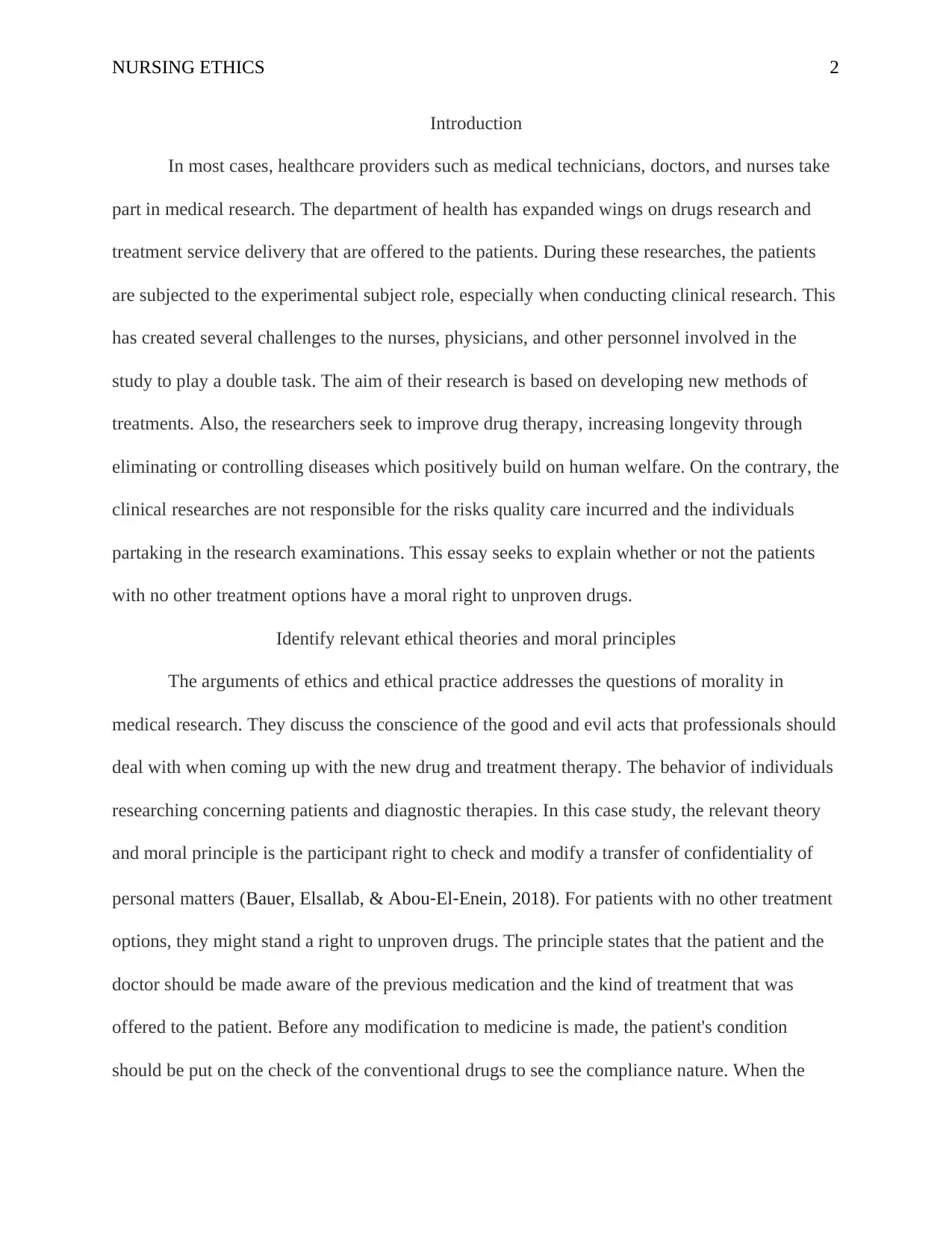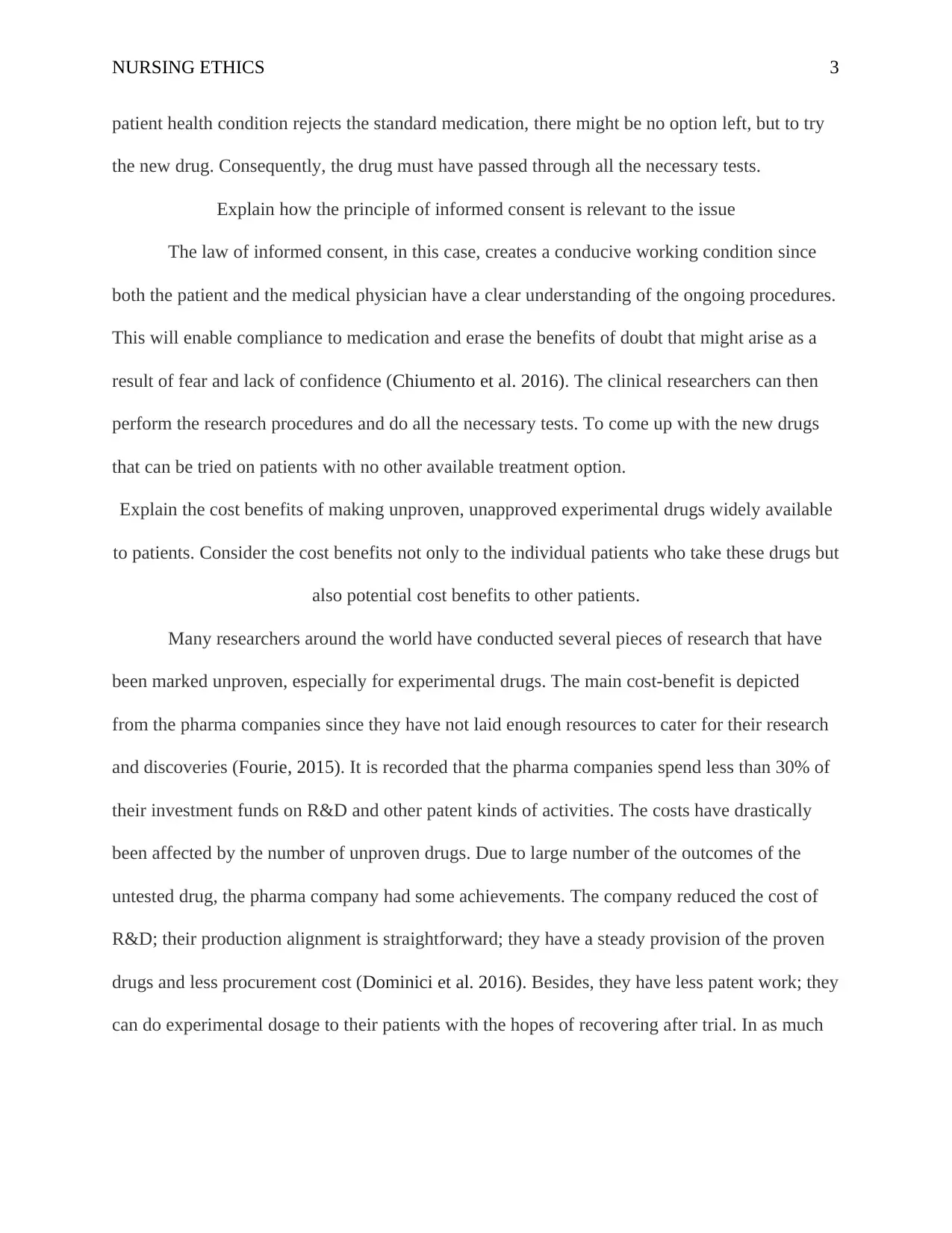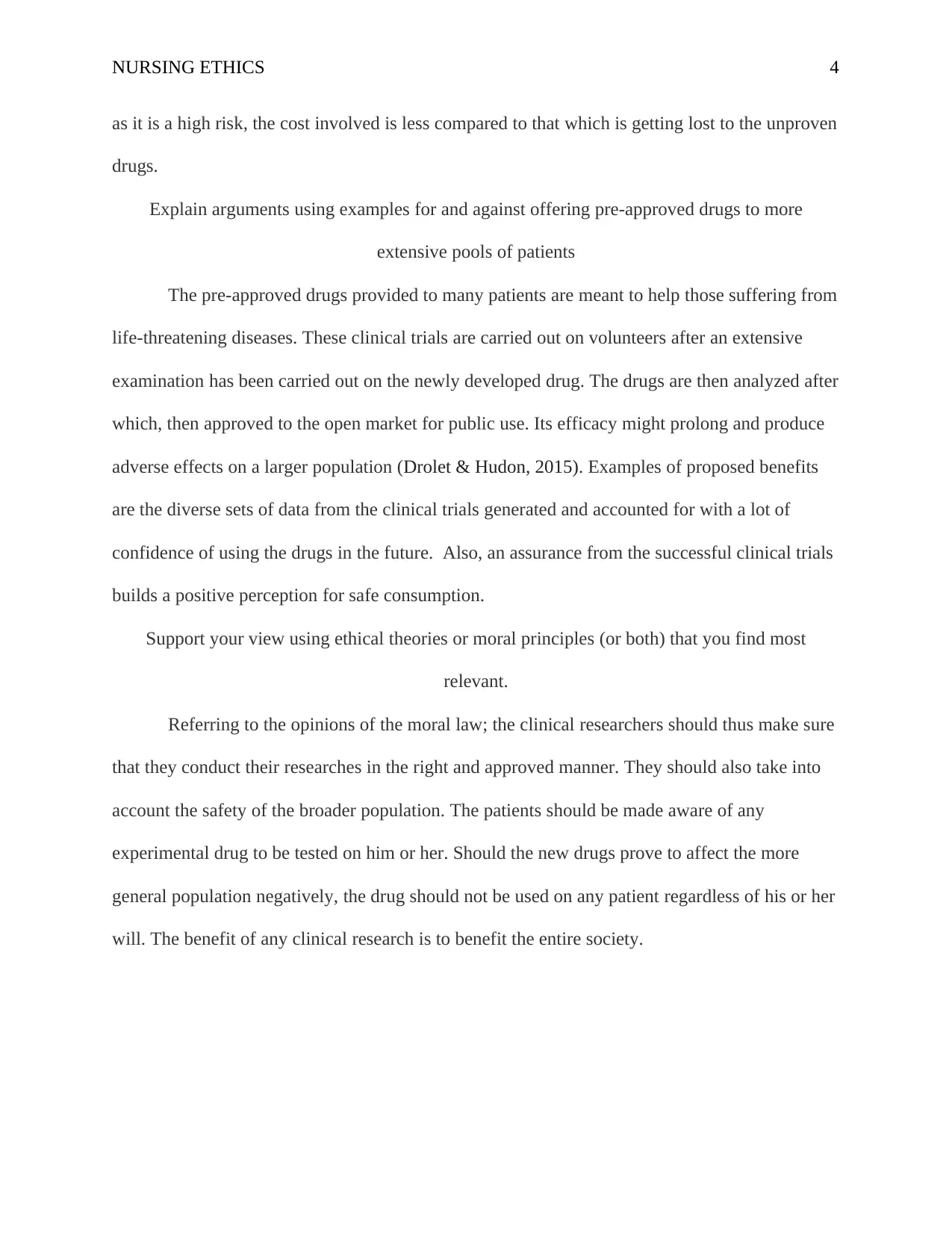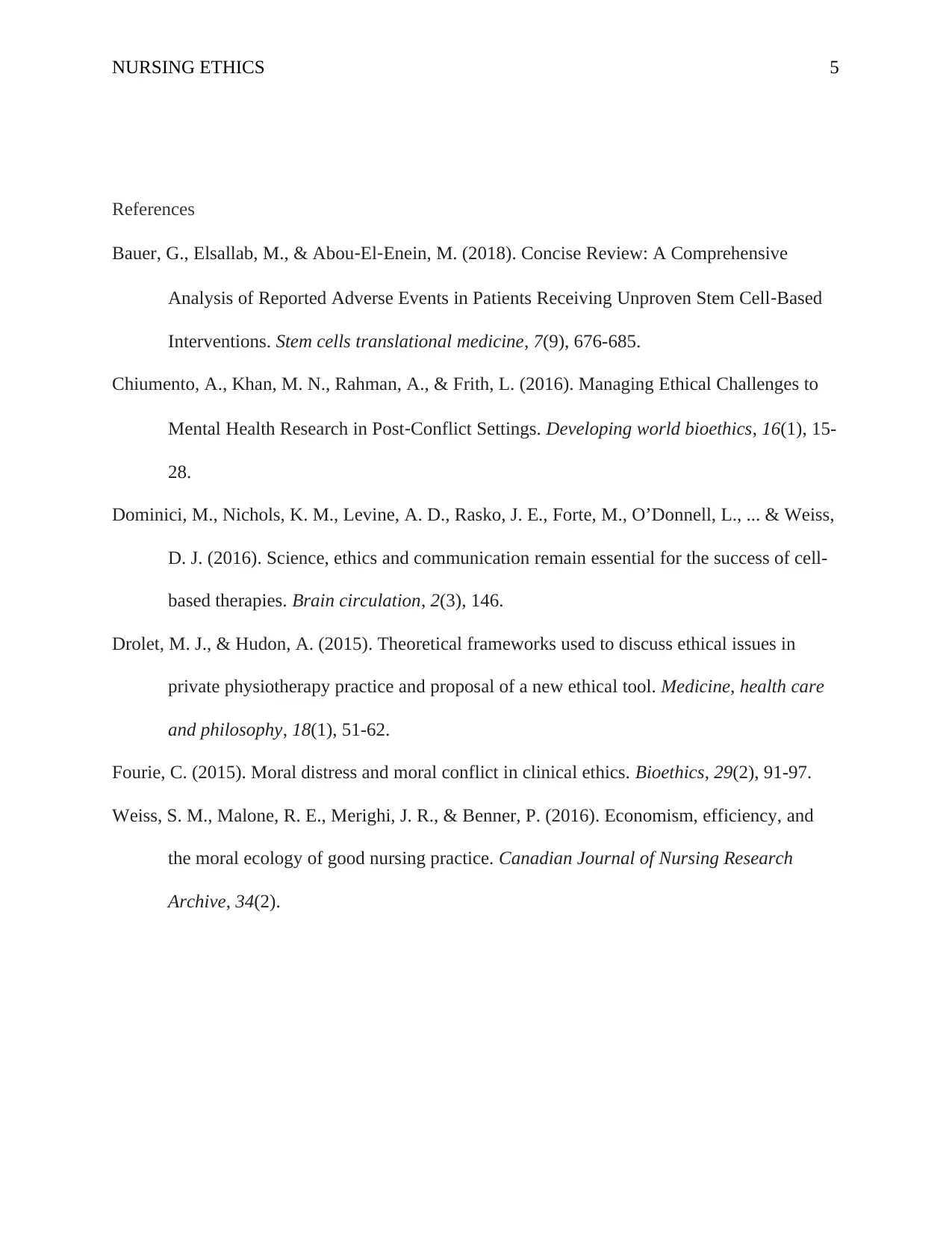Nursing Ethics: Ethical and Moral Implications of Unproven Drugs
VerifiedAdded on 2022/11/25
|5
|1283
|415
Essay
AI Summary
This essay delves into the ethical complexities of nursing, focusing on the use of unproven drugs and their implications for patient rights and clinical research. It examines the role of informed consent, relevant ethical theories, and moral principles in navigating these challenges. The essay explores the cost-benefit analysis of making unproven drugs available, considering the perspectives of both individual patients and the broader patient population. Arguments for and against offering pre-approved drugs to a wider patient pool are presented, supported by ethical frameworks. The essay emphasizes the importance of ethical conduct in clinical research, ensuring patient safety and the well-being of society. The essay concludes by highlighting the critical need for researchers to conduct their work responsibly and transparently, while also ensuring the safety of the population. The essay draws upon various sources to support its arguments and provide a well-rounded perspective on the topic.

Running Head: NURSING ETHICS 1
Nursing Ethics
Student’s Name
Institution Affiliate
Date
Nursing Ethics
Student’s Name
Institution Affiliate
Date
Paraphrase This Document
Need a fresh take? Get an instant paraphrase of this document with our AI Paraphraser

NURSING ETHICS 2
Introduction
In most cases, healthcare providers such as medical technicians, doctors, and nurses take
part in medical research. The department of health has expanded wings on drugs research and
treatment service delivery that are offered to the patients. During these researches, the patients
are subjected to the experimental subject role, especially when conducting clinical research. This
has created several challenges to the nurses, physicians, and other personnel involved in the
study to play a double task. The aim of their research is based on developing new methods of
treatments. Also, the researchers seek to improve drug therapy, increasing longevity through
eliminating or controlling diseases which positively build on human welfare. On the contrary, the
clinical researches are not responsible for the risks quality care incurred and the individuals
partaking in the research examinations. This essay seeks to explain whether or not the patients
with no other treatment options have a moral right to unproven drugs.
Identify relevant ethical theories and moral principles
The arguments of ethics and ethical practice addresses the questions of morality in
medical research. They discuss the conscience of the good and evil acts that professionals should
deal with when coming up with the new drug and treatment therapy. The behavior of individuals
researching concerning patients and diagnostic therapies. In this case study, the relevant theory
and moral principle is the participant right to check and modify a transfer of confidentiality of
personal matters (Bauer, Elsallab, & Abou‐El‐Enein, 2018). For patients with no other treatment
options, they might stand a right to unproven drugs. The principle states that the patient and the
doctor should be made aware of the previous medication and the kind of treatment that was
offered to the patient. Before any modification to medicine is made, the patient's condition
should be put on the check of the conventional drugs to see the compliance nature. When the
Introduction
In most cases, healthcare providers such as medical technicians, doctors, and nurses take
part in medical research. The department of health has expanded wings on drugs research and
treatment service delivery that are offered to the patients. During these researches, the patients
are subjected to the experimental subject role, especially when conducting clinical research. This
has created several challenges to the nurses, physicians, and other personnel involved in the
study to play a double task. The aim of their research is based on developing new methods of
treatments. Also, the researchers seek to improve drug therapy, increasing longevity through
eliminating or controlling diseases which positively build on human welfare. On the contrary, the
clinical researches are not responsible for the risks quality care incurred and the individuals
partaking in the research examinations. This essay seeks to explain whether or not the patients
with no other treatment options have a moral right to unproven drugs.
Identify relevant ethical theories and moral principles
The arguments of ethics and ethical practice addresses the questions of morality in
medical research. They discuss the conscience of the good and evil acts that professionals should
deal with when coming up with the new drug and treatment therapy. The behavior of individuals
researching concerning patients and diagnostic therapies. In this case study, the relevant theory
and moral principle is the participant right to check and modify a transfer of confidentiality of
personal matters (Bauer, Elsallab, & Abou‐El‐Enein, 2018). For patients with no other treatment
options, they might stand a right to unproven drugs. The principle states that the patient and the
doctor should be made aware of the previous medication and the kind of treatment that was
offered to the patient. Before any modification to medicine is made, the patient's condition
should be put on the check of the conventional drugs to see the compliance nature. When the

NURSING ETHICS 3
patient health condition rejects the standard medication, there might be no option left, but to try
the new drug. Consequently, the drug must have passed through all the necessary tests.
Explain how the principle of informed consent is relevant to the issue
The law of informed consent, in this case, creates a conducive working condition since
both the patient and the medical physician have a clear understanding of the ongoing procedures.
This will enable compliance to medication and erase the benefits of doubt that might arise as a
result of fear and lack of confidence (Chiumento et al. 2016). The clinical researchers can then
perform the research procedures and do all the necessary tests. To come up with the new drugs
that can be tried on patients with no other available treatment option.
Explain the cost benefits of making unproven, unapproved experimental drugs widely available
to patients. Consider the cost benefits not only to the individual patients who take these drugs but
also potential cost benefits to other patients.
Many researchers around the world have conducted several pieces of research that have
been marked unproven, especially for experimental drugs. The main cost-benefit is depicted
from the pharma companies since they have not laid enough resources to cater for their research
and discoveries (Fourie, 2015). It is recorded that the pharma companies spend less than 30% of
their investment funds on R&D and other patent kinds of activities. The costs have drastically
been affected by the number of unproven drugs. Due to large number of the outcomes of the
untested drug, the pharma company had some achievements. The company reduced the cost of
R&D; their production alignment is straightforward; they have a steady provision of the proven
drugs and less procurement cost (Dominici et al. 2016). Besides, they have less patent work; they
can do experimental dosage to their patients with the hopes of recovering after trial. In as much
patient health condition rejects the standard medication, there might be no option left, but to try
the new drug. Consequently, the drug must have passed through all the necessary tests.
Explain how the principle of informed consent is relevant to the issue
The law of informed consent, in this case, creates a conducive working condition since
both the patient and the medical physician have a clear understanding of the ongoing procedures.
This will enable compliance to medication and erase the benefits of doubt that might arise as a
result of fear and lack of confidence (Chiumento et al. 2016). The clinical researchers can then
perform the research procedures and do all the necessary tests. To come up with the new drugs
that can be tried on patients with no other available treatment option.
Explain the cost benefits of making unproven, unapproved experimental drugs widely available
to patients. Consider the cost benefits not only to the individual patients who take these drugs but
also potential cost benefits to other patients.
Many researchers around the world have conducted several pieces of research that have
been marked unproven, especially for experimental drugs. The main cost-benefit is depicted
from the pharma companies since they have not laid enough resources to cater for their research
and discoveries (Fourie, 2015). It is recorded that the pharma companies spend less than 30% of
their investment funds on R&D and other patent kinds of activities. The costs have drastically
been affected by the number of unproven drugs. Due to large number of the outcomes of the
untested drug, the pharma company had some achievements. The company reduced the cost of
R&D; their production alignment is straightforward; they have a steady provision of the proven
drugs and less procurement cost (Dominici et al. 2016). Besides, they have less patent work; they
can do experimental dosage to their patients with the hopes of recovering after trial. In as much
⊘ This is a preview!⊘
Do you want full access?
Subscribe today to unlock all pages.

Trusted by 1+ million students worldwide

NURSING ETHICS 4
as it is a high risk, the cost involved is less compared to that which is getting lost to the unproven
drugs.
Explain arguments using examples for and against offering pre-approved drugs to more
extensive pools of patients
The pre-approved drugs provided to many patients are meant to help those suffering from
life-threatening diseases. These clinical trials are carried out on volunteers after an extensive
examination has been carried out on the newly developed drug. The drugs are then analyzed after
which, then approved to the open market for public use. Its efficacy might prolong and produce
adverse effects on a larger population (Drolet & Hudon, 2015). Examples of proposed benefits
are the diverse sets of data from the clinical trials generated and accounted for with a lot of
confidence of using the drugs in the future. Also, an assurance from the successful clinical trials
builds a positive perception for safe consumption.
Support your view using ethical theories or moral principles (or both) that you find most
relevant.
Referring to the opinions of the moral law; the clinical researchers should thus make sure
that they conduct their researches in the right and approved manner. They should also take into
account the safety of the broader population. The patients should be made aware of any
experimental drug to be tested on him or her. Should the new drugs prove to affect the more
general population negatively, the drug should not be used on any patient regardless of his or her
will. The benefit of any clinical research is to benefit the entire society.
as it is a high risk, the cost involved is less compared to that which is getting lost to the unproven
drugs.
Explain arguments using examples for and against offering pre-approved drugs to more
extensive pools of patients
The pre-approved drugs provided to many patients are meant to help those suffering from
life-threatening diseases. These clinical trials are carried out on volunteers after an extensive
examination has been carried out on the newly developed drug. The drugs are then analyzed after
which, then approved to the open market for public use. Its efficacy might prolong and produce
adverse effects on a larger population (Drolet & Hudon, 2015). Examples of proposed benefits
are the diverse sets of data from the clinical trials generated and accounted for with a lot of
confidence of using the drugs in the future. Also, an assurance from the successful clinical trials
builds a positive perception for safe consumption.
Support your view using ethical theories or moral principles (or both) that you find most
relevant.
Referring to the opinions of the moral law; the clinical researchers should thus make sure
that they conduct their researches in the right and approved manner. They should also take into
account the safety of the broader population. The patients should be made aware of any
experimental drug to be tested on him or her. Should the new drugs prove to affect the more
general population negatively, the drug should not be used on any patient regardless of his or her
will. The benefit of any clinical research is to benefit the entire society.
Paraphrase This Document
Need a fresh take? Get an instant paraphrase of this document with our AI Paraphraser

NURSING ETHICS 5
References
Bauer, G., Elsallab, M., & Abou‐El‐Enein, M. (2018). Concise Review: A Comprehensive
Analysis of Reported Adverse Events in Patients Receiving Unproven Stem Cell‐Based
Interventions. Stem cells translational medicine, 7(9), 676-685.
Chiumento, A., Khan, M. N., Rahman, A., & Frith, L. (2016). Managing Ethical Challenges to
Mental Health Research in Post‐Conflict Settings. Developing world bioethics, 16(1), 15-
28.
Dominici, M., Nichols, K. M., Levine, A. D., Rasko, J. E., Forte, M., O’Donnell, L., ... & Weiss,
D. J. (2016). Science, ethics and communication remain essential for the success of cell-
based therapies. Brain circulation, 2(3), 146.
Drolet, M. J., & Hudon, A. (2015). Theoretical frameworks used to discuss ethical issues in
private physiotherapy practice and proposal of a new ethical tool. Medicine, health care
and philosophy, 18(1), 51-62.
Fourie, C. (2015). Moral distress and moral conflict in clinical ethics. Bioethics, 29(2), 91-97.
Weiss, S. M., Malone, R. E., Merighi, J. R., & Benner, P. (2016). Economism, efficiency, and
the moral ecology of good nursing practice. Canadian Journal of Nursing Research
Archive, 34(2).
References
Bauer, G., Elsallab, M., & Abou‐El‐Enein, M. (2018). Concise Review: A Comprehensive
Analysis of Reported Adverse Events in Patients Receiving Unproven Stem Cell‐Based
Interventions. Stem cells translational medicine, 7(9), 676-685.
Chiumento, A., Khan, M. N., Rahman, A., & Frith, L. (2016). Managing Ethical Challenges to
Mental Health Research in Post‐Conflict Settings. Developing world bioethics, 16(1), 15-
28.
Dominici, M., Nichols, K. M., Levine, A. D., Rasko, J. E., Forte, M., O’Donnell, L., ... & Weiss,
D. J. (2016). Science, ethics and communication remain essential for the success of cell-
based therapies. Brain circulation, 2(3), 146.
Drolet, M. J., & Hudon, A. (2015). Theoretical frameworks used to discuss ethical issues in
private physiotherapy practice and proposal of a new ethical tool. Medicine, health care
and philosophy, 18(1), 51-62.
Fourie, C. (2015). Moral distress and moral conflict in clinical ethics. Bioethics, 29(2), 91-97.
Weiss, S. M., Malone, R. E., Merighi, J. R., & Benner, P. (2016). Economism, efficiency, and
the moral ecology of good nursing practice. Canadian Journal of Nursing Research
Archive, 34(2).
1 out of 5
Related Documents
Your All-in-One AI-Powered Toolkit for Academic Success.
+13062052269
info@desklib.com
Available 24*7 on WhatsApp / Email
![[object Object]](/_next/static/media/star-bottom.7253800d.svg)
Unlock your academic potential
Copyright © 2020–2026 A2Z Services. All Rights Reserved. Developed and managed by ZUCOL.





